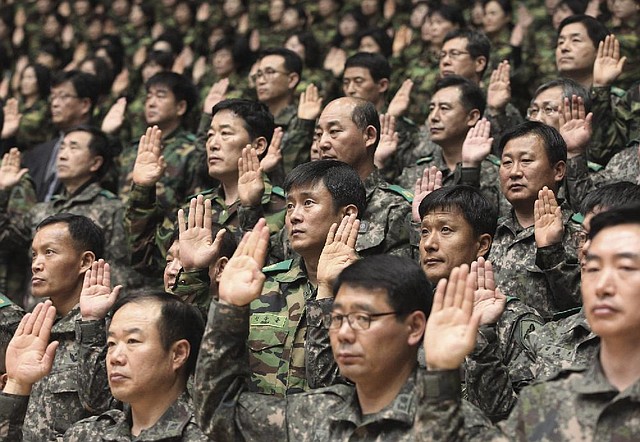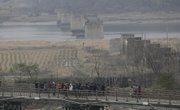Evacuate, N. Korea advises
Can’t ensure foreigners’ safety, nation says
South Korean army reservists show their support for a resolution against North Korea during a gathering Friday at a gymnasium in Seoul. The military tension between the two Koreas has begun to strain the South’s economy.
Saturday, April 6, 2013
MOSCOW - North Korea has advised foreign diplomats to consider evacuating their embassies in Pyongyang in light of increasing tension in the region, Russian and British diplomats said Friday.
Russia’s foreign minister, Sergey Lavrov, told reporters traveling with him in Uzbekistan on Friday afternoon that Moscow is seeking more details about the North Korean statement before making a decision about whether to evacuate.
The British Foreign Office said its embassy “received a communication from the North Korean government this morning saying that the North Korean government would be unable to guarantee the safety of embassies and international organizations in the country in the event of conflict from April 10.”
Lavrov said Russia is treating the statement from Pyongyang as a suggestion and not an order. Some observers in Moscow called Friday’s evacuation advice an obvious propaganda ploy. Russia’s Foreign Ministry said North Korea has made the same proposal to other nations with diplomatic missions in Pyongyang.
The development comes at the end of a week of bellicose threats by the North Koreans against South Korea and the United States. South Korea’s Yonhap news agency, citing intelligence sources in South Korea, reported Friday that the North had moved intermediate-range rocket launchers to its eastern coast, putting the U.S. territory Guam potentially within range of a strike, Reuters news service said.
Moscow is consulting with China, South Korea, the United States and Japan over the evacuation proposal, the Foreign Ministry said.
State Department spokesman Victoria Nuland told reporters in Washington that the United States plans to remain prudent in the face of “an unpredictable regime and an unpredictable situation.”
“This is just an escalating series of rhetorical statements, and the question is,to what end?” she said.
The United States, which does not have an embassy in North Korea, is represented in the country by Sweden.
While urging all sides to refrain from escalation, Russia - which shares a 10-mile border with North Korea - has been particularly concerned that North Korea not attempt a first-strike nuclear attack, triggering inevitable retaliation.
Some Russian analysts have suggested that North Korea has no intention of actually going to war but warn that as rhetoric continues to escalate, a conflict could ignite accidentally.
“The situation is not developing in the direction we would like it to,” an unnamed Russian Foreign Ministry official told the Itar-Tass news agency.
“Now, in such a charged atmosphere, care for safety of our citizens comes to the fore.”
Valery Shnyakin, deputy head of the international affairs committee of Russia’s upper house of parliament, told the Interfax news agency that the North Korean recommendation should be taken seriously.
“As a rule, such statements are made amid unfolding military actions,” Shnyakin said, adding that even if Pyongyang is bluffing, such warnings deserve close attention.
“Russia, the U.S., China, Japan and South Korea should coordinate their efforts and act in a united front,” he said.
The Russian Foreign Ministry statement said: “We are strongly convinced that prevention of military operations on the Korean Peninsula is an imperative. We consider the policy of fanning military tensions absolutely unacceptable, and we hope for the parties’ maximum restraint and composure.”
THREATS FIT PATTERN
North Korea’s threats, while worrisome, appear to fit a decades-long pattern of provocation followed by uneasy peace, the top U.S. military officer said Friday.
“I wouldn’t say I see anything to lead me to believe that this is a different kind of cycle,” Gen. Martin Dempsey, chairman of the Joint Chiefs of Staff, said in an interview after speaking at a ceremony in Stuttgart, Germany.
Other U.S. officials have said this week they see no North Korean preparations for large-scale military action, but White House spokesman Jay Carney said a missile launch isn’t unexpected.
Dempsey called the North’s nuclear threat “just reckless” and contrasted such talk with what he described as measured moves by the U.S. to deter the North and to reassure South Korea.
“Our moves have been largely defensive and exclusively intended to reassure our allies,” he said, referring in part to the announcement that a more advanced missile defense system, designed to knock down missiles in the upper atmosphere and beyond, would be deployed to Guam.
Dempsey said he has talked in the past few days to the commander of the 28,500 U.S. troops in Korea, Gen. James Thurman, about the safety of forces and their families. He said Thurman has made no recommendation to evacuate any military dependents.
Dempsey said that in preparation for a trip to Beijing in a few weeks, he recently spoke by phone to his Chinese counterpart about the North Korea problem, among others, and that this will be on the agenda when he makes his first visit as joint-chiefs chairman.
“What I’m not going to do is go over there and deliver the traditional talking point of: ‘You need to get your southern neighbor under control,’” he said, adding that it’s pretty clear China cannot compel North Korea to act differently.
“I would rather take the opportunity to gain a little deeper understanding of what are the Chinese issues” with the North Koreans, he said.
GLOBAL MARKETS
North Korea’s torrent of threats - and the matching show of military power and political resolve from the United States and South Korea - began showing signs of unsettling foreign investors’ confidence Friday.
“In the past, North Korea-related events had little impact or the markets recovered quickly,” the South’s vice finance minister, Choo Kyung-ho, told a meeting of top finance officials Friday. “But recent threats from North Korea are stronger, and the impact may therefore not disappear quickly.”
South Korean stocks fell 1.64 percent Friday in a selling spree among foreign investors that analysts attributed to jitters over North Korea. The South Korean currency won also sank against the U.S. dollar.
Although South Koreans have become almost nonchalant after decades of on-and off threats from North Korea, they believe that when things get ugly with the North, their globalized economy has much more to lose than the North’s isolated and already highly sanctioned economy.
“The North Koreans are now using the propaganda in an extreme form to try to damage foreign direct investments into South Korea,” said Tom Coyner, a member of the U.S. Chamber of Commerce in Korea and author of Doing Business in Korea. “They are, in a sense at this point, winning in an asymmetrical psychological warfare, attacking the economic strength of South Korea.”
Government officials said the military tensions had so far had only limited effects on the markets.
But for the South Korean economy, the North Korean imbroglio is an additional drag at an inopportune time. In the face of the weakening Japanese yen, which hurts South Korean exporters, South Korea recently announced a sharp cut in growth forecasts.
Officials vowed to ensure stability if the situation got worse.
Information for this article was contributed by Will Englund and Chico Harlan of The Washington Post; by Robert Burns of The Associated Press; and by Choe Sang-hun of The New York Times.
Front Section, Pages 1 on 04/06/2013


